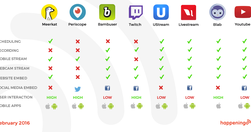Filter 876 resources:
- facebook (337)
- media (127)
- social media (121)
- news (117)
- comments (94)
- disinformation (87)
- community (83)
- medium (75)
- bot (73)
- participation (58)
- algorithm (54)
- mobile (53)
- filter bubble (51)
- data visualisation (42)
- ai (40)
- content strategy (38)
- design (36)
- tool (31)
- eu (30)
- blogging (30)
- curation (29)
- troll (29)
- instant articles (26)
- twitter (26)
- us2020 (26)
- privacy (25)
- platform (25)
- psychology (25)
- politics (23)
- interactive (23)
- promotion (22)
- google (21)
- journalism (20)
- web (20)
- factchecking (20)
- democracy (20)
- advertising (19)
- covid19 (19)
- video (17)
- storytelling (17)
- transparency (17)
- metrics (17)
- regulation (16)
- audiovisual (16)
- ux (16)
- ocm (16)
- analytics (15)
- cms (15)
- data (15)
- trump (14)
- app (14)
- censorship (14)
- trust (14)
- newsletter (13)
- attentionweb (13)
- open web (13)
- amp (13)
- information architecture (13)
- realtime (12)
- data journalism (12)
- animation (12)
- conspiracy (12)
- us (12)
- engagement (12)
- blog (12)
- gamification (11)
- semantic (11)
- egovernment (11)
- linkedin (11)
- native advertising (11)
- livestream (11)
- nytimes (10)
- strategy (10)
- enewsletter (10)
- deletefacebook (9)
- communications (9)
- innovation (9)
- cofoe (9)
- evidence-based policy (9)
- content marketing (9)
- technology (9)
- cambridge analytica (9)
- polarization (8)
- online architecture (8)
- policy (8)
- bloggingportal (8)
- longform (7)
- open source (7)
- minimalist (7)
- productivity (7)
- html5 (7)
- science (7)
- hate (7)
- content (7)
- machine learning (7)
- k4p (7)
- moderation (7)
- myhub (7)
- tv (7)
- newsroom (6)
- delegitimise (6)
- google analytics (6)
- notification (6)
- interface (6)
- web design (6)
- apple (6)
- ec (5)
- ewrc2017 (5)
- blockchain (5)
- qanon (5)
- addiction (5)
- cognitive (5)
- backfire effect (5)
- nlp (5)
- instagram (5)
- knowledge management (5)
- messaging (5)
- peakbot (5)
- augmented reality (5)
- quartz (5)
- event (5)
- ethics (5)
- ea (5)
- clickbait (5)
- guide (4)
- coral (4)
- snapchat (4)
- chat (4)
- psychometrics (4)
- information (4)
- gender (4)
- free (4)
- ai4communities (4)
- marketing (4)
- identity (4)
- ello (4)
- facebook live (4)
- surveillance (4)
- fbpaper (4)
- cookies (4)
- cards (4)
- mybot (4)
- visualisation (4)
- viral (4)
- fediverse (4)
- multilingualism (4)
- sentiment analysis (4)
- science communication (4)
- social marketing (3)
- humour (3)
- digital transformation (3)
- management (3)
- startup (3)
- propaganda (3)
- ui (3)
- conversational (3)
- business model (3)
- audience research (3)
- agile (3)
- publicsphere (3)
- free speech (3)
- internal communications (3)
- big data (3)
- pay4content (3)
- science journalism (3)
- local (3)
- climate (3)
- stream (3)
- buzzfeed (3)
- live (3)
- visual (3)
- uk (3)
- multimedia (3)
- paywall (3)
- conversation (3)
- slack (3)
- copyright (3)
- gdpr (3)
- authenticity (3)
- future (3)
- europcom (3)
- publication (3)
- b2b4me (3)
- election (3)
- ep (3)
- amazon (3)
- responsive (3)
- fblabrats (3)
- paper (3)
- publicsector (3)
- letters2eu (3)
- vandenbrande (3)
- brussels bubble (3)
- collective intelligence (3)
- antitrust (3)
- 2ndbrain (3)
- roamresearch (3)
- echo chamber (3)
- domestic (3)
- listicle (2)
- gawker (2)
- narratives (2)
- twitterenvy (2)
- rss (2)
- nsa (2)
- youth (2)
- ft (2)
- bias (2)
- machine text (2)
- lobby (2)
- youtube (2)
- deep fake (2)
- campaign (2)
- brand (2)
- society (2)
- trending (2)
- zettelkasten (2)
- reddit (2)
- project management (2)
- infographic (2)
- text (2)
- government (2)
- blm (2)
- persuasion (2)
- leadership (2)
- livefyre (2)
- network effect (2)
- bestof2015 (2)
- suppress (2)
- media literacy (2)
- publishing (2)
- canonical debate lab (2)
- credibility (2)
- filter (2)
- groupthink (2)
- brexit (2)
- pilot (2)
- collaboration (2)
- headline (2)
- statistics (2)
- adblock (2)
- mvp (2)
- partisan (2)
- seo (2)
- buzzbot (2)
- faq (2)
- eci (2)
- 3d (2)
- andy matuschak (2)
- jeff jarvis (2)
- hoax (2)
- team (2)
- influence (2)
- tumblr (2)
- gif (2)
- vote (2)
- happiness (2)
- fascism (2)
- cory doctorow (2)
- monopoly (2)
- wearable (2)
- interoperability (2)
- training (2)
- software (2)
- narcissism (2)
- populism (2)
- tribe (2)
- cor (2)
- crowdsourcing (2)
- scrollytelling (2)
- data4policy (2)
- mastodon (2)
- moments (2)
- feed (1)
- mixed reality (1)
- data enrichment (1)
- stack overflow (1)
- seamful (1)
- micro-moment (1)
- d2d (1)
- counter speech (1)
- willpower (1)
- intranet (1)
- datamining (1)
- apple news (1)
- upday (1)
- samsung (1)
- signaltonoise (1)
- webgl (1)
- syndication (1)
- mooc (1)
- membership (1)
- diig (1)
- dao (1)
- smartcities (1)
- epsc (1)
- autonomous (1)
- referendum (1)
- knowledge visualisation (1)
- homepage (1)
- cx (1)
- assist (1)
- europe (1)
- fiction (1)
- tag (1)
- usa (1)
- elon musk (1)
- editorial (1)
- keyword (1)
- buffer (1)
- hype (1)
- ixd (1)
- crisis (1)
- reinventing (1)
- image (1)
- egov (1)
- digg (1)
- self-management (1)
- economics (1)
- open science (1)
- knowledge graph (1)
- d3 (1)
- explainer (1)
- context (1)
- fotl (1)
- millennials (1)
- car (1)
- traffic (1)
- iot (1)
- europa (1)
- ma parent (1)
- roi (1)
- hyperknowledge (1)
- eparltv (1)
- i-book (1)
- photography (1)
- eptv (1)
- trends (1)
- social login (1)
- consultation (1)
- lgbt (1)
- shortform (1)
- icebucketchallenge (1)
- confirmation bias (1)
- google+ (1)
- paid (1)
- chatgpt (1)
- theme (1)
- kpi (1)
- portal (1)
- timeline (1)
- paradigm (1)
- anonymity (1)
- archive (1)
- wayback (1)
- ipad (1)
- taxonomy (1)
- linked data (1)
- ecas (1)
- register (1)
- screencast (1)
- adaptive (1)
- liquid (1)
- chinese (1)
- upworthy (1)
- cmv (1)
- llm (1)
- civil rights (1)
- right (1)
- expiration (1)
- governance (1)
- bloom (1)
- faceted search (1)
- snowden (1)
- internet of things (1)
- convert (1)
- cro (1)
- game (1)
- basic (1)
- customers (1)
- votewatch (1)
- mep (1)
- top3pods (1)
- web2.0 (1)
- podcast (1)
- agent (1)
- mojo (1)
- supergirl (1)
- grassroots (1)
- experiment (1)
- cultural exchange (1)
- humility (1)
- curatorbot (1)
- messenger (1)
- osmo (1)
- language technology (1)
- learn (1)
- debatehub (1)
- ep2014 (1)
- sensecraft (1)
- roaming (1)
- ip (1)
- eesc (1)
- nhscitizen (1)
- visualization (1)
- colfdusion (1)
- (1)
- eu09vs19 (1)
- migration (1)
- sortition (1)
- popvox (1)
- decentralised (1)
- report (1)
- bookmarklet (1)
- post-alpha (1)
- hosted (1)
- geofence (1)
- blackpr (1)
- joan westenberg (1)
- cohesion (1)
- eu2024 (1)
- threadapalooza (1)
- gatsby (1)
- substack (1)
- creativity (1)
- virtual reality (1)
- nz (1)
- sage (1)
- antivaxxer (1)
- rail (1)
- intuition (1)
- model collapse (1)
- circuit-breaker (1)
- at4democracy (1)
- pink slime (1)
- usability (1)
- flicc (1)
- ginsburg (1)
- participatory culture (1)
- ghost (1)
- myanmar (1)
- arg (1)
- floc (1)
- standards (1)
- w3c (1)
- crowdtangle (1)
- github (1)
- opengov (1)
- web development (1)
- motivated (1)
- mobocracy (1)
- demographics (1)
- airbnb (1)
- perception (1)
- crowdfunding (1)
- writing (1)
- quora (1)
- debunk (1)
- inoculation (1)
- comics (1)
- optimisation (1)
- 360video (1)
- metaverse (1)
- spambot (1)
- label (1)
- region (1)
- ipr (1)
- sceptic (1)
- stacked note (1)
- ibm (1)
- intro (1)
- uber (1)
- conference (1)
- design thinking (1)
- jobtodo (1)
- eurosceptics (1)
- customer support (1)
- machine translation (1)
- complex (1)
- automation (1)
- tutorial (1)
- gds (1)
- learning (1)
- khub (1)
- ideation (1)
- euractiv (1)
- empathy (1)
- opinion (1)
- russia (1)
- microsoft (1)
- physics (1)
- holacracy (1)
- reflect (1)
- quiz (1)
- transmedia (1)
- snowfall (1)
- coda (1)
- bbc (1)
- blogpocalypse (1)
- disruption (1)
- hoaxy (1)
- share (1)
- notion (1)
- scandinavia (1)
- competition (1)
- facial blindness (1)
- capgras (1)
- health (1)
- emotion (1)
- how to (1)
- logo (1)
- periscope (1)
- deadbot (1)
- craft (1)
- loyalty (1)
- impact (1)
- vox (1)
- prototype (1)
- knowledge panel (1)
- telegram (1)
- fomo (1)
- education (1)
- city (1)
- wechat (1)
- rantic (1)
- cooperatives (1)
- snapshot (1)
- inscrutable (1)
- transport (1)
- taxibot (1)
- atomisation (1)
- multisig (1)
- dni (1)
- guardian (1)
- ambassador (1)
- newsfeed (1)
- china (1)
- parse.ly (1)
- wapo (1)
- experience (1)
- ethereum (1)
- pwa (1)
Overview: Online Strategy
How should your online presence be shaped?
Is your website working? Do first-time visitors understand what you do, and find the content they need, before clicking away? If not, should you tweak your site or build a new one?
Perhaps you should spend more resources on social, but to do what: engage your audience, convene a community, or simply broadcast your website content?
How can you do both so that your social media presence and your website work together? And what are you measuring, so that you continuously improve?
Need help? Get in touch.
More services: start with Communication strategy.
Relevant resources
Using push notifications can be a very effective and powerful way to gain and maintain audience engagement on mobile apps. But if not done correctly, they can turn out to be utterly irritating. ... Personalization is the way forward if push notifications are to survive.

By the time Cameron wrote “Orbital Content” in April of 2011, almost all visits to A List Apart and zeldman.com were triggered by tweets and other third-party posts... SO JUST WHY are we afraid of Medium?

If you create live video, here’s that table of live streaming apps you’ve been searching for.

Over the next few years, there is no doubt content and attention will continue to shift from tens of millions of web sites to a few centralized networks that people access via apps
"I’m posting different things in different places, not just reposting the same thing over and over" - in response to Shel Holtz and Dave Winer on Medium

As a reporte... there may be a simple solution to the bad commenter problem: You. When reporters get involved, it results in fewer uncivil comments, according to research... “it’s like a teacher walks into a classroom and suddenly all the kids are quiet and fold their hands at their desks.” Here are a few tips and best practices for reporters in …
uncivil comments dropped by 15 percent when reporters were participating in the conversation
a closer look at what types of comment sections news organizations ... value they are adding to news organizations’ overarching strategies...a list of questions to ask and best practices for news organizations seeking return on investment...key questions, considerations and links to further reading for evaluating what commenting strategy works bes…

The European Political Strategy Centre gathered a select group of leading international academics to provide input to the ongoing public consultation on a regulatory environment for online platforms.

Plebiscite-pushers have got Europe's voters hooked on the cheap rush of direct democracy

Howdy, a bot company devoted to automating common workplace tasks. Its product lives in Slack ... operates in the background, listening for the keywords and questions that will activate its powers. ... automates meetings, asking what people are working on, collating their answers, and distributing them to the team ... take your lunch order ... AI…

Mobile requires a different set of UI/UX and needs different forms of content and advertising, too. That's easy to write, but very hard to implement, especially if you have a newsroom full of experienced people who have learned their trade with a different paradigm in mind. Media startups like vox.com, Buzzfeed, Huffington Post and others... adapt…

“How data is generating green lights to keep you moving on the road” is a piece of native advertising paid for by Siemens and written by Quartz’s marketing team. It’s also a perfect example of how Quartz is bringing compelling storytelling and design to sponsored content... Quartz uses an in-house creative team to extract relevant stories and ta…

The news organisation has mostly been focusing on revamping its mobile apps, but the next step is bringing some of the learnings back to the homepage... third in a series looking at how news organisations are now approaching the homepage, after it was pronounced dead by many in 2014... our real challenge everyday is to come in and say 'ok, who…

Every business in the world will have a bot. It will allow any customer to talk to them in the simplest way possible, sending a message.

bringing new technology into the newsroom to change how the outlet commissions and publishes opinion pieces ... expand the coverage beyond just text, into visual story formats that can be accessed and shared across different platforms.... the FT's comment section is a "huge source of strength and a very valuable asset".... a new Facebook commu…

2015 MARKED PROPUBLICA’S most ambitious year to date in visual and interactive storytelling...here are some highlights from the year that was.
Facebook’s news feed algorithm can be tweaked to make us happy or sad; it can expose us to new and challenging ideas or insulate us in ideological bubbles... The algorithm’s rankings correspond to the user’s preferences “sometimes,” Facebook acknowledges... not the success rate you might expect A glimpse into its inner workings sheds light ... on…

“print dollars have turned into digital dimes, which are turning into mobile pennies.” Basically, even as we consume more news than ever, thanks to mobile’s proliferation, the revenue streams are actually diminishing... Where’s the money going to then, you ask? To Facebook, Google, and Twitter, the winners on mobile...As publishers turn more and …

Facebook already accounts for a huge proportion of the web traffic to major media sites. And publishers are rushing even further into its embrace because they have no choice and can’t think of a better option... ad blocking is taking care of what’s left of the media’s ambitions to continue as standalone entities... there are rays of hope in the …

Publishers like the New York Times should be having an existential crisis over Facebook’s instant articles. Instead they’re embracing them.. digital content is being divided between a lucrative high-end entertainment world,... and a low-end publishing world where content is expected to be “free,” ... a model that... might work to BuzzFeed’s adv…

full rollout in those markets, and elsewhere in Europe, is slated for “early 2016”.) Upday sounds as if it will be aggregating a variety of editorial content based on contextual signals available via mobile — such as user location and interests. UPDAY will offer Samsung customers access to a range of news content that combines ‘Need to Know’ in…

the power of Facebook’s algorithmic News Feed... doesn’t show users everything their friends post, and so Facebook can demand a toll from publishers for placement in the stream. Today that toll looks like simply programming content to the algorithm, tomorrow it looks like publishing Instant Articles, and maybe next year it looks like paying Facebo…

Here are 8 tips for using Medium effectively:
for an actual brand, developer or publisher wondering if they should do an app or a website, I generally answer that the calculation is much simpler and less technical: Do people want to put your icon on their home screen? ... If you don't have that relationship, then all the clever things ... are irrelevant and your strategy should focus on the w…
By 2016, most content will be consumed ... on other people’s platforms... Snapchat Discover, Facebook Instant Articles, and Apple News... Google AMP is coming soon, and it will provide an Instant-like experience for not only Google users but also those using Twitter, Pinterest, and other platforms

In recent years, a core group of commenters have helped to transform The New York Times for the digital era. Their voices have enhanced our journalism, offering new information, insight and analysis on many of the day’s most pressing issues.These frequent commenters have also become a community, one that has its own luminaries.But who are they? We…

for anyone outside Facebook’s Partner Publisher network, the new feature can be somewhat confusing.
it’s now perfectly clear that mobile is the future of technology and of the internet. But within that, there's a huge range of different themes and issues, many of which are still pretty unsettled. I outline what I think are the 16 topics to think about within the current generation, and then link to the things I’ve written about them.
the big media institutions knew that they really couldn’t leave their business models, they were locked in... there really is an open question to whether digital journalism will replace the profit margins of traditional journalism... one huge issue in journalism today is how a couple places, particularly Facebook, are becoming a major source of…
Loading more...